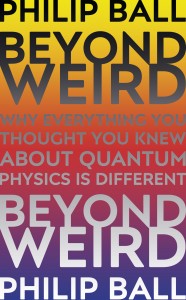Behind the Book | Interactions: Conversation with Philip Ball
Published in Physics

 How did the idea for “Beyond Weird” take shape?
How did the idea for “Beyond Weird” take shape?
Over the past several years I found myself writing various articles about aspects of quantum mechanics, such as the classical–quantum transition and decoherence, uncertainty relations, quantum computing. It began to dawn on me that many of the standard “stories” we science writers — and often scientists themselves, especially when speaking to a general audience — fall back on to convey what happens in quantum physics are incomplete, misleading or plain wrong. Partly this is due to poor metaphors used to talk about what pioneers like Bohr and Einstein said; partly it’s because conceptual and technical advances have reshaped the narrative in the past few decades, for example by realising in the laboratory what were previously considered just thought experiments. So the book is an attempt to bring the presentation of quantum mechanics up to date, and to get away from the habit of referring to a ‘weird’ kind of behaviour bound up with ‘wave–particle duality’, ‘two paths at once’ and so on.
In the book it looks like you wish to deconstruct some statements and comments associated with the theory of quantum mechanics and its interpretation(s)— noting the limitations of these statements and the confusions stemming from these — in order to usher in a more positive message taking the form of a ‘quantum reconstruction’ — finding new axioms for quantum mechanics. Do you view your book as a manifesto?
If the book is a manifesto, then it’s for ceasing to use the shaky old clichés and find better language, better images. But what are these? I’m not sure we yet know, though I tentatively suggest a few. It is definitely not a manifesto for a particular interpretation of quantum mechanics, although I do think that the informational perspective has brought a fresh and fruitful view — literally so, given the technologies which it spawns. In this respect, I also wanted to point out that these ‘quantum technologies’ are not merely applications of quantum mechanics: they bind practical potential very closely to the fundamentals. Then even so, regarding quantum mechanics as ‘all about information’ is not without its problems either.
One big point I wanted to make is that we need to try harder to get away from ‘explaining’ quantum mechanics with classical stories. The idea that a particle ‘takes both paths at once’ through the double slit is a prime example: we think in terms of classical paths that happen to be weirdly simultaneous. I don’t think that helps. The same applies to ‘spooky action at a distance’: quantum nonlocality isn’t the technical term to that, it’s the alternative.
What do you hope the readers to take away from the book? What reactions do you expect?
I hope the readers will take away a fresh perspective on how to think about the counter-intuitive aspects of quantum mechanics, and feel dissatisfied with articles that merely say ‘quantum is weird’. I would be very happy if we could hear less about Schrödinger’s cat in the future too.
I hope the book can be understood by anyone who is interested to read it. Some parts will be challenging, but I don’t see how you can avoid that with a book that tries to grapple seriously with the foundations of quantum mechanics. I don’t mind if general readers don’t understand it all; I will be glad if it simply stirs new thoughts and images. Some people have implied that it’s impossible to write a book which deals seriously with quantum mechanics without mathematics — evidently I disagree. In fact, I think that part of the problem is a tendency to hide behind maths, saying ‘Oh, we can only talk about this properly by showing the equations’. I completely disagree with that, and I’m reassured that John Wheeler did too. It will be interesting to see what knowledgeable folks make of the book. I expect some to disagree vehemently, at some point or another. That’s fine, although I hope there is nothing too egregiously wrong. I do think that it is impossible to write a serious book about the meanings of quantum mechanics without offending the sensibilities of some experts, but I hope I’ve been fair.
While you touch on the various existing interpretations of quantum mechanics, you dedicate an entire chapter to the Many Worlds Interpretation (MWI). Why did you focus on the MWI?

The MWI, as I say in the book, is the one with all the glamour (whereas the Copenhagen interpretation is the opposite). It seems curiously over-represented among physics popularisers, and I think that’s no coincidence. I suspect it’s the one interpretation that a lot of people with a passing interest in quantum mechanics are familiar with — so its prominence in popular culture seemed to warrant giving it particular attention.
To be honest, however, the attention I gave it was also born of frustration. The problems which the MWI presents — problems with developing any kind of coherent picture of our actual experience (and if you can’t reconnect with that, there’s indeed a problem) — seem to be swept under the carpet, sometimes even flatly ignored. This is partly because they amount to philosophical or metaphysical problems concerned with identity, uniqueness, and the existence of facts: physicists too often feel that it is not their duty to think about such aspects. But it looks like a cheat to put those issues outside of physics and claim that they’re therefore no longer a problem. By contrast, I don’t see such philosophical issues with other interpretations — their difficulties seem to be of a more technical nature.
Throughout the book, you observe that language can act as a barrier preventing a clear and accurate expression of some concepts at the very core of quantum mechanics. While writing the book, did you ever feel stuck with the wrong words?
Yes, I did. Indeed, some of the kind experts who read it pointed out how I had used words (such as ‘state’) too loosely or inappropriately. It’s terribly easy to do so, at least for someone like me. That seems to have been partly why Bohr wrote so slowly and, it must be said, sometimes so turgidly — he was trying very hard to find the right words, probably harder than anyone else. And he was clearly frustrated by the limitations of words. While writing the book, I was struck by how unclear or careless even experts have sometimes been with words such as ‘nonlocality’. Realistically, it seems unlikely that I have done any better — but I’ve tried.
Some people have said that we shouldn’t get too hung up on words, but I think it is only through words that we know if we have really understood something. Mathematics might be the language of nature, yet words make the languages of humans and ultimately science has to deliver understanding, not just equations.
The book:


Please sign in or register for FREE
If you are a registered user on Research Communities by Springer Nature, please sign in